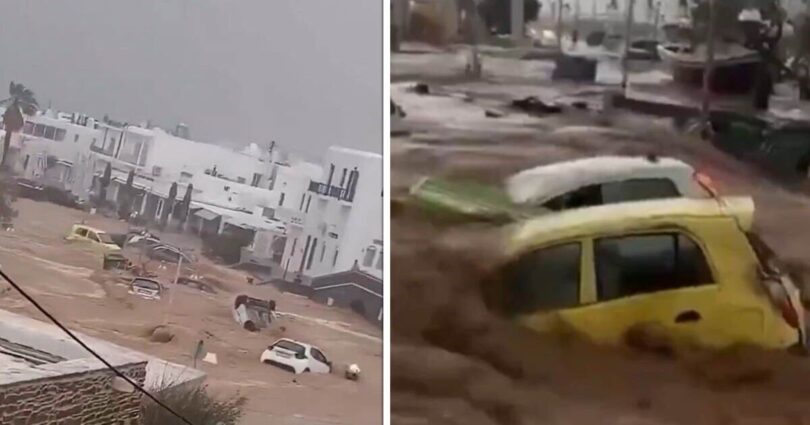A powerful storm struck the Greek islands of Paros and Mykonos – both favourites amongst tourists – on Monday (March 31), triggering widespread flooding and forcing authorities to close schools and impose a ban on all traffic but emergency vehicles. Floodwaters rushed down through the streets renowned for their stunning whitewashed buildings, dragging cars and debris with them.
There will be no let-up, either, as forecasters warn that further severe weather is on the way. Heavy rain is set to hit the Aegean islands, particularly the Cyclades archipelago, where a red warning was imposed until early Tuesday morning (April 1). The heavy rain and thunderstorms are expected to continue until Wednesday morning, affecting much of the country.
Authorities on Paros said 13 people stranded in the storm were taken by firefighters to their homes. No one has been reported injured or missing. The main towns of Parikia and Naousa – both popular holiday destinations – were particularly hard hit by the flooding.
Paros Mayor Kostas Bizas, speaking on local media, gave an insight into the severity of the situation: “The rain started around 3 pm and hasn’t let up. We’ve had drivers trapped on roads near Lefkes and the Parikia-Naoussa axis”.
On Mykonos, where the flooding was less intense, excavators cleared a path for floodwater as it raged past seafront cafes and restaurants.
Authorities ordered schools on Paros, Mykonos and two other Aegean Sea islands to remain closed on Tuesday, while the civil protection service sent phone alerts instructing residents to stay indoors.
Several islands near Paros, also in the Cyclades group, remain under severe weather warnings throughout Tuesday.
The National Meteorological Service has issued updated forecasts of heavy rain and thunderstorms, which are expected to continue until Wednesday morning and affect the Ionian Islands, mainland regions, Macedonia, Thrace, the Aegean Sea and Attica.
Residents and tourists in affected areas are urged to remain vigilant and follow official safety guidelines amid the storm.
The storms have hit Greece just as the country gears up for the popular Easter period when tourists flock to the likes of Athens, Corfu, Santorini and Mykonos before temperatures soar in the summer.
Last year, ABTA (Association of British Travel Agents) estimated that approximately two million Brits would travel abroad for the Easter holiday, including to destinations such as the Canary Islands, mainland Spain, Cyprus and Turkey.
Source link








